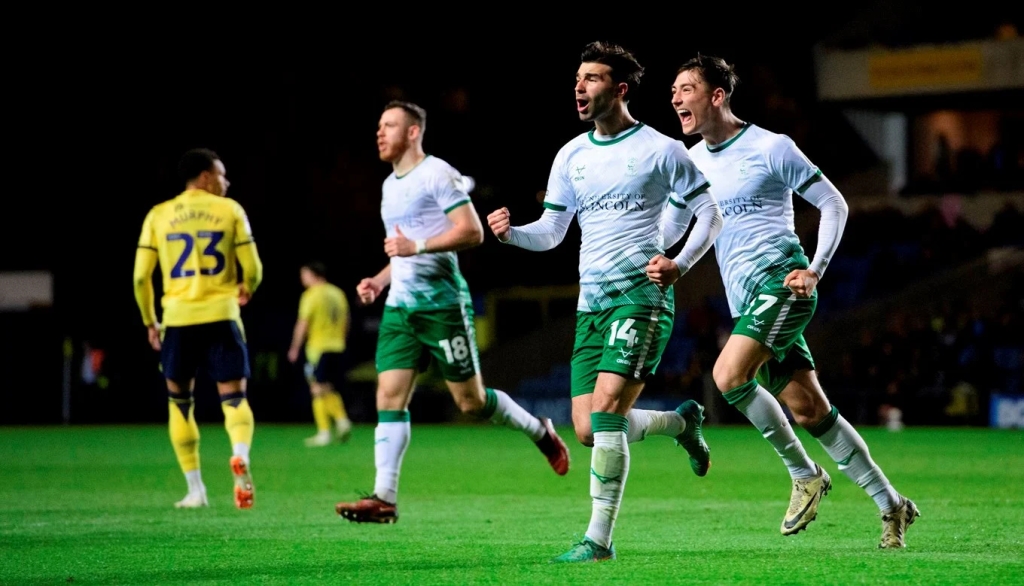
There was always going to be a correction.
Amongst the waves of optimism crashing joyously over the Kassam on Saturday, I had one small nagging doubt. Like Chief Brody in Jaws, spying an ominous fin cutting through the water amongst the holiday makers, there was one thing I couldn’t ignore.
Don’t get me wrong; Saturday was no accident, it was a performance of the highest quality against a very good side in a fantastic atmosphere. Because it was unusual, doesn’t make it fortuitous.
After Peterborough, we’d won three games, scored thirteen goals and conceded none. No team wins every game by four or five goals. No team can avoid conceding for weeks on end. For every action, there’s a reaction, every goal against Peterborough would raise an alert with Lincoln about our attacking threats, every pass would soak more fatigue into Josh McEachran’s muscles. At some point, all these things would conspire to bring this run to an end.
In order to make the play-offs we needed our three win sequence to extend throughout our remaining three league games. Then, to succeed in the play-offs we’d need another three positive results. So, to be successful and get promoted, we needed to conjure up something close to a nine-game winning streak against the best teams in the division. To do that, we’re gonna need a bigger boat.
So, there had to be a correction. There was hope that it would be at a time of our choosing, perhaps at Exeter, secure in the knowledge we’d be in the play-offs, we could rest some players and switch the magic form machine back on for the play-off campaign. There was even some discussion about who we might want to face – probably not Peterborough because we’d beaten them 5-0 recently, or Bolton because we’d lost to them 5-0 recently.
There’s a lot said about navigating the play-offs – teams are seen to have an advantage if they have a late run or go in with momentum. But, let’s pause and think about that – a late run is drawn from middle distance running and the tactic of sitting towards the back of the pack before bursting through at the end. Do teams, by choice, reserve some of their form earlier in the season so they can time their run at the play-off places at the end? Did Lincoln, or indeed us, drop points deliberately in order to spring a surprise late season attack? Seems unlikely.
In physics, momentum is ‘mass in motion’, it implies that a force is being applied. But the force being applied to push a team on isn’t physical, it’s not momentum in the literal sense. These are metaphors for one thing – confidence.
With confidence you try things you might not otherwise. Confidence is the difference between Billy Bodin chipping the keeper from twenty-five yards and him heading for the corner flag to protect a lead. It’s an assuredness in your ability; Cameron Brannagan is immensely confident, he feels able to shoot from distance on a regular basis knowing he’ll fail most times and succeed occasionally.
Lincoln came into the game off one defeat in seventeen. They knew their meat and two veg, short back and sides 4-4-2 worked despite their result against Wigan at the weekend. They had the confidence to defend deeply and in numbers, occupying the great plains of space Josh Murphy enjoyed on Saturday.
I have a sneaking admiration for teams like this, who ignore orthodoxy or established best practice and find a system that suits them. Lincoln may not play progressive football; but they’re very good at what they do. They’re comfortable and confident in their own skin, not something we always enjoy.
This well established confidence gave them licence to be patient, without a point to prove, they focussed entirely on ensuring that whatever they did, they did with purpose. Equally, our risk versus reward model did what it’s supposed to do – we created a couple of chances while conceding a couple of chances. Our confidence from Saturday coupled with their confidence made for a tight and intriguing game.
By remaining steadfast they opened the door for us to become frustrated by our lack of progress, they allowed the occasion to pull the game apart. They knew that as time went on we’d want to take more risks, the crowd would become agitated and mistakes would create openings. The decisive opportunity came within seconds of the restart, the referee, seemingly caught out by their break, rushed into making a judgement rather than a decision. We looked on the back foot and certain to concede, when Rodrigues lunged into the tackle it looked like it might be a penalty, which was enough for the referee, even though replays seem to show that clearly it wasn’t.
From there, by having to go on the front foot, we were on the back foot. As we probed, they overloaded the game with niggles – Browne was battered, Brannagan was introduced and seemed to enter an interminable argument with Ethan Erhahon. Petty fouls forced the referee into a series of marginal decisions, each one making the next more significant and difficult. This all ate time and built tension, the crowd got frustrated and we lost focus. Lincoln stayed resolute, confident they didn’t need to contribute anymore to the game in terms of entertainment, confident that they could run the clock down and still be heroes. We were caught in their trap and could have few complaints.
So the correction has happened, the penalty decision was harsh and perhaps we deserved a point. The response seems fairly measured, nobody is completely surprised that it happened, even though we hoped it wouldn’t. What’s critical is how we respond and how we retain the confidence we’ve established over the last few weeks. Our response is a choice; we might as well enjoy it, it’s not going to get any easier.





